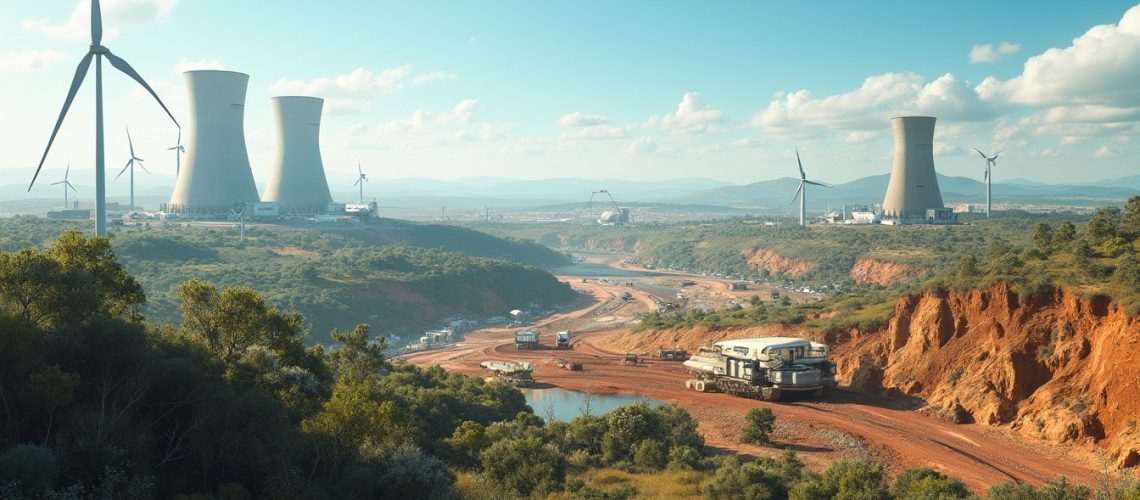Australia stands at a critical juncture in its energy strategy, with opposition leader Peter Dutton proposing a bold $211 billion nuclear power plan that could fundamentally reshape the nation’s resource and energy sectors. This comprehensive proposal aims to transform Australia’s energy infrastructure, potentially reinvigorating the uranium mining industry and positioning the country as a significant player in nuclear energy development.
Why is Nuclear Power Being Proposed for Australia’s Energy Future?
The proposed nuclear strategy emerges from complex energy challenges facing the nation. Rising technological demands from artificial intelligence, electric vehicle proliferation, and industrial growth have exposed limitations in traditional renewable energy sources.
Energy stability remains a paramount concern for Australia’s economic competitiveness. Dutton’s vision emphasises nuclear power as a cornerstone for long-term emissions reduction while guaranteeing stable and affordable electricity generation. The plan, meticulously modelled by Frontier Economics, outlines an ambitious roadmap of seven nuclear power plants by 2050, with the first expected to commence operations by 2036.
As Dutton boldly stated, “Nuclear power will underpin the economic success of our country for the next century,” signalling a transformative approach to national energy policy.
How Will This Impact Uranium Mining in Australia?
Australia currently holds a significant global position in uranium production, ranking fourth worldwide and controlling approximately one-third of known global reserves. Despite this impressive potential, state-level restrictions in Western Australia and Queensland have substantially constrained uranium mining operations.
Currently, only South Australia operates active uranium mines, with the Olympic Dam standing as a testament to the country’s mineral wealth. These regulatory limitations have prevented Australia from fully capitalising on surging global demand for uranium as nations expand their nuclear energy initiatives.
The proposed nuclear strategy could unlock substantial economic opportunities. Lifting mining restrictions would potentially:
- Create thousands of employment opportunities
- Attract significant foreign investment
- Position Australia as a competitive uranium supplier alongside nations like Kazakhstan, Canada, and Namibia
- Spur exploration in previously untapped regions
Geological and Market Considerations
The Olympic Dam represents a globally significant uranium deposit, offering unparalleled mineral grades that distinguish Australian resources. Projects like Yeelirrie demonstrate further potential for uranium extraction, contingent upon regulatory framework modifications.
Australia’s stable political environment presents a compelling advantage over uranium-producing regions experiencing geopolitical uncertainties. This governance stability could attract international mining investments and partnerships.
Regulatory Landscape and Challenges
Current mining restrictions in Western Australia and Queensland represent significant hurdles. Lifting these limitations would require:
- Advanced environmental safeguarding protocols
- Modernised regulatory frameworks
- Comprehensive workforce training programs
- Sophisticated radioactive waste management strategies
The Minerals Council of Australia emphasises the urgency of making Australia competitive in the global nuclear resources market.
Environmental and Political Debates
Prime Minister Albanese’s Labor government continues prioritising renewable wind and solar technologies, positioning these as more sustainable alternatives. Environmental groups raise concerns about potential ecological damage, contamination risks, and long-term radioactive waste management challenges.
Proponents argue that uranium mining aligns with net-zero emissions targets and ensures a reliable, economically sustainable energy future.
Market Psychology and Investment Strategies
Uranium mining represents a complex intersection of speculative investment and long-term geopolitical stability. Current political uncertainties significantly influence investor sentiment, creating a nuanced investment landscape.
Global nuclear energy trends suggest Australia’s potential market entry could create unique strategic investment opportunities. The sector’s volatility demands sophisticated, informed investment approaches.
Future Outlook: Speculative Perspectives
Potential regulatory reforms could radically transform Australia’s uranium output trajectory. A relaxation of mining restrictions might:
- Attract new companies to the Australian market
- Diversify mining outputs
- Stimulate sector-wide investment
Advances in nuclear waste management technologies could mitigate existing environmental concerns, potentially paving the way for broader industry acceptance.
Conclusion
Australia’s $211 billion nuclear power plan represents a potential watershed moment for the nation’s energy and resource sectors. By balancing political challenges, environmental considerations, and market dynamics, Australia could position itself as a global leader in nuclear energy and uranium production.
For more detailed insights into this transformative proposal, readers can reference the original mining industry report.
Investors interested in understanding the broader context might find value in exploring investing in mining stocks and digital transformation in mining.
Ready to Transform Your Investment Strategy?
Start your journey with Discovery Alert’s real-time notifications and gain insights into the fast-paced world of ASX mineral discoveries. Whether you’re eyeing short-term trades or evaluating long-term opportunities, our AI-driven alerts and in-depth geological reports make it simple. Experience a 30-day free trial and unlock the science behind successful investing by visiting Discovery Alert.







